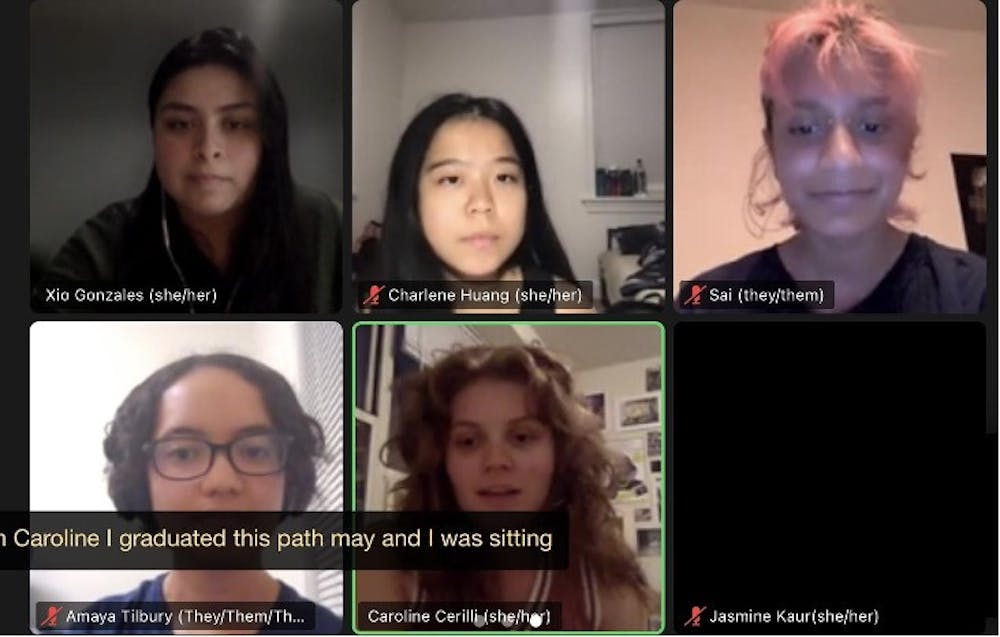The Hopkins chapter of The Women’s Network (TWN) hosted its first Diversity, Equity and Inclusion (DEI) event on Oct. 13 to discuss accessibility in professional spaces. The event’s Zoom panel featured three student speakers who shared their experiences with finding internships and jobs on and off campus.
In the panel discussion, Caroline Cerilli, a Hopkins alum, discussed the process of disclosing disabilities in job applications.
“It’s just kind of weird to assert [my disabilities],” she said. “Most of my interviews have been over Zoom and that makes [my disabilities] especially invisible.”
Although she works at a non-profit organization that advocates to improve the lives and rights of those with disabilities, she noted that the leadership at the institution is largely non-disabled. She highlighted the importance of finding people who understand the work versus those who do it out of a sense of doing good for disabled people.
In the panel discussion, sophomore Amaya Tilbury outlined the pressures of living with visible disabilities.
“I have to be the poster child for disabled people, so that people don't think less of other disabled people,” they said. “If I act professional enough, if I'm competent enough, then I will be seen the same as everyone else who's doing less than me.”
Tilbury also described their experience facing casual ableism in the University environment, which can take on subtle forms like assumptions about disabled people and seemingly innocent phrases and actions.
“During my freshman year, when I was starting to work in groups, people just assumed a bit less of me, which was not fun because I don't like to be assumed less,” they said. “But I got through it. People don't do that once they get to know me. They just have to get to know me first.”
Junior Sai Dharmasena detailed examples of causal ableism in classrooms. According to them, there have been teachers who blatantly disregarded disability accommodations, such as denying requests for extra exam time.
“People think that people with disabilities have an advantage over others simply because they want to have equal access to everything that people normally have,” they said.
The speakers also recounted their experiences with requesting accommodations from Student Disability Services (SDS) at the University. Tilbury, when asking for housing accommodations before entering their sophomore year, was denied to request more than one suitemate.
In addition, according to Dharmasena, there has been an overall bureaucracy and lack of sensitivity in SDS’s operation.
“Every time I called them, they sounded fed up with my situation, and it made me feel horrible for requesting something that I needed,” they said.
However, Cerilli also underscored the benefits of connecting with the disabled community at the University.
“[During] my first year here, there was a small group, Advocates for Disability Awareness,” she said. “That has had such a huge effect on me. It's really really nice to have that baseline kind of community since it's really hard for disabled people to find each other.”
Freshman Jasmine Kaur, who attended the panel discussion, shared her thoughts on the event in an interview with The News-Letter.
“I enjoyed hearing about the experiences of fellow students but was disappointed in the shortcomings of the University to support students and especially at some of the professors.” she said.
Kaur hopes for similar events in the future, which would allow students’ experiences and stories to be shared.
In an email to The News-Letter, senior Xiomara Gonzales, the Vice President of DEI for TWN, explained why the organization chose the event’s topic.
“I've been aware of the accessibility problems on campus since freshman year when a fellow classmate was unable to access a review session because the elevator in a building did not work.” she wrote. “My own experience and interest grew into an idea that I workshopped until the event took place.”
Gonzales highlighted the importance of community engagement to raise disability awareness. According to her, open conversations about disabilities are the first step to push for progress by shifting the narrative and correcting misconceptions associated with them.
In an interview with The News-Letter, Tilbury emphasized the importance of representation to raise disability awareness.
“At some point, it’s a matter of making people care by featuring more disabled people in the media or talking about them like they’re people in classes, but it’s a long process, and we’ve so much of it to go,” they said.
Tilbury described their outlook on the progress of the disability rights movements.
“It’s no longer a complete taboo to be disabled, and that’s incredibly freeing. We’ve got a long way to go in terms of progress made both locally and globally, but I truly think the important thing is that we’re finally creating a community everyone is aware about. People are finally starting to see us, and it’s long overdue,” they said.
Charlene Huang is one of the Vice Presidents of Marketing for The Women’s Network and a Social Media Manager at The News-Letter. She did not contribute to the reporting, writing or editing of this piece.





